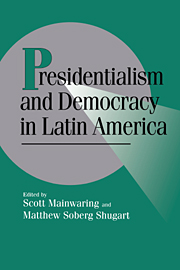Book contents
- Frontmatter
- Contents
- Contributors
- Acknowledgments
- Introduction
- 1 Presidentialism and Democracy in Latin America: Rethinking the Terms of the Debate
- 2 Multipartism, Robust Federalism, and Presidentialism in Brazil
- 3 The Unrealized Potential of Presidential Dominance in Colombia
- 4 Presidential Behavior in a System with Strong Parties: Venezuela, 1958–1995
- 5 Strong Candidates for a Limited Office: Presidentialism and Political Parties in Costa Rica
- 6 Political Sources of Presidencialismo in Mexico
- 7 Evaluating Argentina's Presidential Democracy: 1983–1995
- 8 In Defense of Presidentialism: The Case of Chile, 1932–1970
- 9 Executive–Legislative Relations in Post–Pinochet Chile: A Preliminary Assessment
- 10 Hybrid Presidentialism and Democratization: The Case of Bolivia
- 11 Conclusion: Presidentialism and the Party System
- Appendix: Outlines of Constitutional Powers in Latin America
- References
- Index
Introduction
Published online by Cambridge University Press: 05 June 2012
- Frontmatter
- Contents
- Contributors
- Acknowledgments
- Introduction
- 1 Presidentialism and Democracy in Latin America: Rethinking the Terms of the Debate
- 2 Multipartism, Robust Federalism, and Presidentialism in Brazil
- 3 The Unrealized Potential of Presidential Dominance in Colombia
- 4 Presidential Behavior in a System with Strong Parties: Venezuela, 1958–1995
- 5 Strong Candidates for a Limited Office: Presidentialism and Political Parties in Costa Rica
- 6 Political Sources of Presidencialismo in Mexico
- 7 Evaluating Argentina's Presidential Democracy: 1983–1995
- 8 In Defense of Presidentialism: The Case of Chile, 1932–1970
- 9 Executive–Legislative Relations in Post–Pinochet Chile: A Preliminary Assessment
- 10 Hybrid Presidentialism and Democratization: The Case of Bolivia
- 11 Conclusion: Presidentialism and the Party System
- Appendix: Outlines of Constitutional Powers in Latin America
- References
- Index
Summary
This book addresses two fundamental issues. First, it addresses the current debate regarding the liabilities and merits of presidential government. Does presidentialism make it less likely that democratic governments will be able to manage political conflict, as many prominent scholars have argued recently? Our contribution to this debate is to interject skepticism that presidentialism has generally contributed significantly to the problems of democratic governance and stability, although we recognize that it may have done so in specific cases. These questions about the general desirability of presidentialism have been at the core of a first generation of recent comparative studies of presidentialism that essentially began with Juan Linz's seminal critique of this regime type.
Second, we examine variations among different presidential systems, the implications of these variations for executive–legislative relations, and their consequences for democratic governance and stability. In Chapter 1 and the Conclusion, as well as the nine country chapters, we argue that presidential systems vary in important ways, above all according to (1) the constitutional powers accorded to the president and (2) the kind of parties and party system. We also explore how these variations in presidential powers and the party system affect the performance of presidential democracy. We believe that the first generation of (recent) comparative studies of presidentialism did not always pay sufficient attention to these issues. While we recognize the important contributions of this first generation of comparative studies, we believe that these questions on variations among presidential systems and their implications should form the core of a new generation of studies.
- Type
- Chapter
- Information
- Presidentialism and Democracy in Latin America , pp. 1 - 11Publisher: Cambridge University PressPrint publication year: 1997
- 6
- Cited by



